Minding the Gap is a powerful, poetic piece of non-fiction filmmaking, but it’s the kind whose elemental force sneaks up on you. For example, the first time I saw Bing Liu’s aching coming-of-adulthood documentary, I basically didn’t even notice that it uses the same ambitious temporal framework as Richard Linklater’s Boyhood. Here is a movie that quietly covers twelve years in the lives of its three major characters (one of whom is Bing Liu himself) and never outwardly calls attention to it. It gives off the illusion that we are watching things happen slowly, but every now and then time will surge forward like a sudden patch of rapids in a gentle stream. We get to see our characters when they are mere children (two of them 16 and one of them only 11) and we leave them some 90 minutes later as young adult men with the pain, wisdom and personal growth of more than a decade etched into their faces. Time rushes all about Minding the Gap. The great weight of the past, the anxious immediacy of the post-adolescent present, and the trembling enigma of the future. A couple speaks with excitement and trepidation about the impending arrival of their first child, and a scene later their infant son has already been there for months. One friend, a black teenager, speaks about wanting to be like his older white friend but, thirty minutes later, two years have gone by and he has an entirely different understanding of who his friend is and of who he now wants to be. It’s not that I didn’t know that time was passing the first time I watched Minding the Gap. But the film flows with such grace that I marked the movie in emotional beats, not temporal ones. It was only late in the film when we see the characters flash back through their entire story once more, that I realized I had watched three people struggle and grow up right in front of my eyes. Like Boyhood, Bing Liu’s film has its eye fixated on the subtle and sometimes seismically sudden growth of its characters. Its leaps forward in time, as impressive as they are, are more impressive for how organically they are tailored to the film’s story rhythms. The wide span of time the film covers is not there to call attention to itself. It is there to make a seemingly small story about skateboarding and growing up in recession-addled America feel as overwhelming as some great epic. Minding the Gap is about three small lives in an unassuming Midwest city, but it contains oceans of insight and emotion. This babbling brook hides tidal waves.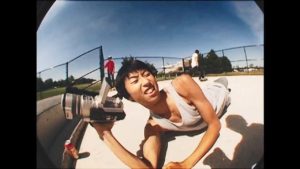
Minding the Gap’s tiny, forgotten corner of the world is Rockford , Illinois, an economically ravaged industrial city in America’s Rust Belt. It is the hometown of 30 year-old filmmaker Bing Liu and his friends, Zack and Keire. Zack is white and the same age as Bing. Keire is black and five years younger than Zack and Bing. All three friends grew up in dysfunctional homes with varying levels of abuse. As many a confused, hurting American adolescent has done, Bing and his friends turned to each other and to a community of skateboarders to find some sense of stability and understanding. And, without cheapening the poverty and crime that exists there, I must say that the rundown, brick-and-iron aesthetic of Rockford, Illinois makes a stunning backdrop for this tale of frustration, stalled dreams, and worn out spirits. While Minding the Gap is mostly the intimate story of three friends grappling with becoming men and reckoning with abusive pasts, the beautifully dilapidated skyline of Rockford lends a sense of something larger to their stories; the sense of an America full of stories and cities just like this. Rockford carries a lot of heavy psychic weight for Bing, Keire, and Zack, but the film’s aim is to make some kind of tenuous peace with the misery and hardship, not to be destroyed by it. Liu films his travels through these crumbling streets with a complicated feeling of affection, and the result is that a kind of weathered halo seems to hang over all the heartache and ruin. Those old red buildings and wooden townhouses really do look beautiful, never more so than when Bing and his surrogate skater family is whipping past them on skateboards, the closest things they have found to deliverance. Late in the film, Zack sadly observes that he may not be capable of turning his past trauma into something worthwhile. Turning ugly truth into beautiful poetry is not an ability everyone has, but Bing Liu has that talent in spades. Minding the Gap is all about dealing with the painful past and trying to make something good and beautiful out of the scars. In the way it views its desperate city and its wounded subjects, it is a prayer for the broken down and bruised things in this tough world.
What makes Bing Liu’s stunning debut so organically beautiful is how it almost seems to stumble on its own deep well of hurt by accident. From its early frames, it is about hardscrabble upbringings and familial tensions, but it is not immediately clear how important the subject of fraught family histories will be. In its opening moments, it promises to be an empathetic view of young men skating and stumbling toward maturity, but it is not initially evident that this will also be a film about abuse. I tend to believe that this maybe wasn’t even Bing Liu’s immediate intention. At least not when he first started filming his skater friends as a troubled sixteen year-old. What I do know is that Bing Liu was living in a house with a very physically abusive stepfather when he first began to collect footage of his friends. It would not surprise me a bit to learn that the instinct to start filming that time period was, just like skating itself, a subconscious release valve for his suffering. But, part of what makes Minding the Gap marvelously moving and authentic is how the story of Bing Liu’s abuse, the story he may have always wanted to tell deep down, seems to find him over the course of filming. The film has a natural curiosity about its subjects. At the beginning, it is content to just observe Zack and Keire and learn about them. We bear witness to the trials of adulthood that Zack and Keire are just beginning to face. Both have reached ages where they need to go to work and pay bills. Moreover, the Peter Pan-like Zack is also figuring out how to provide a stable home life for his girlfriend, Nina, and their infant son. All of this is is poignant and absorbing enough. And then a bomb drops. One night, Bing sees cell phone footage of Zack and Nina having a drunken shouting match. Nina sounds livid, warning Zack that she will kill him. Bing is concerned for his friends. He starts to gingerly kick at the dirt, to get a better sense of what is going on. In the process, he learns that Zack may sometimes hit and throw Nina when he gets intoxicated. And, as much as he may have felt hesitant to confront his own abuse before, Bing Liu now feels a duty to lean in closer; to investigate his friends and himself. Minding the Gap becomes the story of Bing Liu walking down a dark and haunted path of trauma and familial dysfunction. If only for Nina’s sake, he now feels an obligation to stare down the cycles of abuse in his own backyard. And, as it turns out, economically depressed Rockford has a grave history of abuse. At the time of filming, domestic incidents accounted for 25% of the city’s significant violent crime statistics. Bing starts asking questions about his friends’ own experiences with abusive fathers. He learns Keire was often physically disciplined very harshly as a child. Zack tells stories of a father who was kind and permissive when he was very young, but who took a sharp turn into sternness and emotional distance when Zack reached adolescence. The hardest part of all this is that Bing Liu must come to terms with his own experience being abused. His abuse story appears to be the most scarring of all. Bing’s half-brother recalls hearing Bing’s screams from the regular beatings he received and still feels haunted by it. The hard choice Bing must make is to gracefully but firmly reopen the past; to turn the most horrific memories around in his fingers and gaze at them without fear. He must shine a light on his own demons and he must interview his soft-spoken immigrant mother, who was also abused and who felt powerless to protect her child. Minding the Gap is about the difficult moral choice not to shield ourselves or the world around us from bitter truths. When it comes to something as ugly and pervasively toxic as domestic abuse, truth must be dragged screaming into the light.
Minding the Gap is a brave, unflinchingly compassionate exhumation of the painful past. It could not have been easy to make a film that indicts domestic abuse so thoroughly, especially when that abuse was something you suffered through personally. But if there’s one thing that may (and I stress the word “may” here) be harder than interviewing your own weeping mother about long-buried traumatic memories, it’s trying to approach a friend who has now become an abuser. The sudden revelation that Zack is beating Nina is a painful shock to Bing Liu and to any viewer who has been listening to him and empathizing with him for the first thirty minutes of the film. It crystallizes the film’s true raison d’etre and sends Bing Liu, dismayed but intrepid, off on his journey to uncover the past. We register the hurt and disbelief on Bing’s face when he learns that someone he loves and calls a friend is now enacting the same kind of terrible behavior Bing suffered through as a child. The scenes where Bing interviews his mother may throb with the most raw, cathartic anguish, but the longer path toward bringing up the subject of abuse with Zack may be what the film is really building to. Calling out abuse when it comes from one of our own is the true test of conscience. Up to this point in the film, we have spent substantial time with Zack. He is a flighty, boozy, sometimes ridiculous figure, but he seems to also be a generally thoughtful and self-aware person. We have viewed him through Bing’s eyes and come to understand him, and then we learn something that completely alters everything we thought we were seeing. Zack does not come off as some easy monster, and that may be the scariest truth of all. His frailties, his fears of adulthood and fatherhood, and his need to escape from his own hurt are relatable and resonant. Minding the Gap is an endlessly rich character study and I left feeling deeply connected to all of its characters, even this immature, abusive flounderer. I found myself caring a great deal about Zack. And I say that not to excuse his galling conduct, but to zero in on how difficult it must have been for Bing to confront him. Bing, who has known Zack almost his entire life. How gutting and hard it must be for anyone with friends who have engaged in toxic and violent behavior to call those friends on their bullshit. But, of course, you must! The fear of seeing the monster of abuse in the eyes of someone you love and the reflex to turn away from it or rationalize it; that is where the cycle of abuse lives. Bing Liu knows this all too well and he receives repeated signals from family and friends to maybe leave it all alone. Nina worries that confronting Zack will forever sabotage any hope of a peaceful home situation for her child. Bing’s mother prays through tears that he will one day be able to leave the past behind, and Bing even agrees that this may be the end goal. But abuse cannot just be left well enough alone, in the vain hope that it will resolve itself. If the traumatic past is to be buried for good, it cannot be in some shallow, forgotten grave. To move on from something like that, you have to fully come to terms with it, glean everything you can from it, and lay it honorably to rest. Minding the Gap is a film that courageously refuses to use any half-measures when it comes to exploring domestic violence.
This makes Minding the Gap a film that is serenely thunderous. It is as damning about abuse and toxic masculinity as any film I can name, but it refuses to scream itself hoarse or flail its fists. The kinds of abuse the film examines should make us angry, but anger is not the approach the film takes. I think Bing Liu must figure that a reactionary response to hurt is probably what caused all this trouble in the first place. Angry men under pressure keep passing their pain along and nothing gets resolved. The last thing Bing Liu wants is to turn his anguish into more confusion and torment. Instead, he wants to find male rage where it lives and understand it. The film’s critique of toxic masculinity is withering, but its strategy is to talk the beast down rather than hurl invective at it. It brings focus and tranquility to subject matter that would make the average person feel dizzy with rage and sorrow. Minding the Gap is simply one of the most superb essays ever crafted on what it means to be a man; what too many men wrongly think it means and what it should mean. In a year full of beautiful and trenchant works on the subject of masculinity, Minding the Gap is one of the most fearlessly truthful. Bing Liu reveals himself to be that most welcome kind of documentarian. He is the kind who is more eager to bear witness than to speak; quicker to coax out his subject’s deepest thoughts than to hammer his own point. He is on a journey to process his own hurt and what he wants is to understand why cycles of male violence keep repeating. Where rage, depression, and abuse are concerned, his wish is to better see what the point is; why these old, bitter ghosts cling to American men from generation to generation. The desperate, embittered places some men go when they feel slighted, cornered, confused, or out of options is a terrible and pervasive blight on our society. It makes one’s blood boil to think about it and I don’t think we can coddle it or rationalize it one minute longer. We can never accommodate domestic abuse. What we can do is dismantle this terrible behavior in healthy ways. What Bing Liu has managed here is a kind of resistance that draws immeasurable strength from a sense of serenity. Its mode is one of deeply empathetic concern. To put it another way, Minding the Gap is Paddington’s hard stare in documentary form: unyielding, unafraid, and powerful in its peaceful refusal to meet hostility with more hostility.
Minding the Gap becomes one of the most moving examinations of abuse ever made partly because it invests in character. It seems doubtful that Bing Liu will ever make another film where he is this close to his human subjects, but, my God, does he ever make that sense of intimacy and familiarity count here. He has a gift for listening closely and calmly asking the right questions. The confessions that his friends and family make to him contain some of the most wrenching and poignant truth that you’ll find in any 2018 film. Bing Liu also has a keen awareness of where he fits into this tapestry of American dreams and discontent. In a greatly moving scene late in the film, Bing tells Keire that he wanted to learn more about his friends’ experiences with abuse because he sees himself in their stories. I’ve written before about the notion of walking with the subject. That’s the theory of studying a person or culture that says the observer must take their own presence into account. When you write a study or make a documentary, you inevitably become a character in the story you are crafting because you are interacting with your subject. Instead of trying to stay out of the frame and pretend like you are not there, the more honest approach is to just admit that you are a part of the documentary. By choosing to explore a subject, you enter that world and become a subject yourself. You don’t pretend to be observing from a remove, as if hidden behind the duck blind. You join your subject and walk beside them. In the case of Minding the Gap, Bing Liu participates in what you might call “skating with the subject”. Skating is one of the only unshakable sources of joy and liberation for these earnest, haunted young men, and that feeling really shows in the film’s numerous skateboarding scenes. Those scenes move with an unmistakable kind of elation. Bing and his friends tear through the battered brick blocks of their weary city, and their very act of moving says volumes about the pain they have endured and the hope they are grasping toward. And when you finish dabbing your dewy eyes, you might suddenly come to and realize that this is, after all is said and done, a skateboarding movie. Here’s something I can add to 2018’s list of unexpected cinematic achievements: a film about skating moved me to tears. It’s really just par for the course for a film that finds poetry, heartache, and frayed beauty tucked away in the most forgotten and unassuming places.


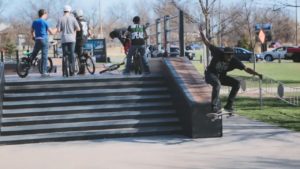


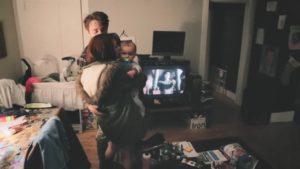


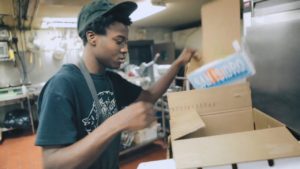

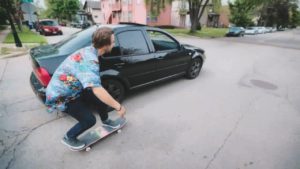


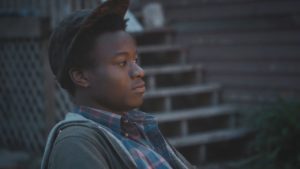
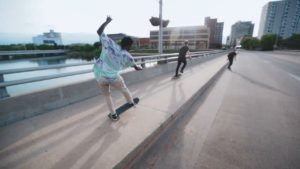
wonderful!
i did think it was interesting how different poverty looks in the midwest, which the movie is maybe not trying to highlight, but it was something that was very glaring to me living in ca